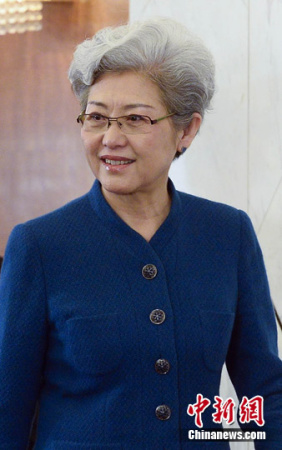
File photo of Fu Ying.
China and the United States need to rebuild consensus on their relations amid growing negative speculation on each other's strategic intention, a senior Chinese legislator said Tuesday.
Fu Ying, chairperson of the Foreign Affairs Committee of the National People's Congress of China, said in her lecture at a seminar titled "Rebuilding Trust: China-U.S. Relations" at Stanford University in Northern California that she has found that perceptions of the bilateral relationship are highly diversified in both China and the United States.
Fu, who is also chairperson of the Academic Committee of China's Institute of International Strategy at the Chinese Academy of Social Sciences, said some members of the China watcher community in the United States have assumed that China is trying to drive the United States out of the Western Pacific, and have even foreseen a conflict between the two countries.0 Also, the U.S. media are depicting the South China Sea as a new geopolitical wrestling ground for China and the United States.
However, Fu sees "a different picture" in the ongoing China-U.S. interactions: Chinese President Xi Jinping and U.S. President Barack Obama have had lengthy meetings at least twice a year; nearly 5 million people travelled between the two countries last year; the two militaries have engaged in more exchanges and dialogues than before; and the two countries are working together to play a leading role in global issues such as climate change and nuclear security.
"There is no denying the fact that the ground is shifting in China-U.S. relations, which has resulted from China's fast economic growth," said Fu, who served as Chinese vice foreign minister before assuming her current post three years ago. "The need for cooperation and the impact of competition are both growing."
Fu told some 200 people at Stanford's Freeman Spogli Institute for International Studies that "the gap between perceptions and real life may reflect the need to rebuild consensus."
She has observed that while there is no shortage of optimistic voices, there is increasing anxiety in the United States about what a global role China is going to play. "A view we often hear from the United States is that China is seeking to dominate the Asia-Pacific and replace the U.S. leadership. This we see as a reflection of the United States' own fear of losing its primacy in the world."
In comparison, she said, China's academia is relatively more positive, and academics tend to look at the changes in China-U.S. relations from the perspective of the international order. "Many see the status of the relationship no longer as the weaker vis-a-vis the stronger. Nevertheless, they do not see the relationship as between two strong powers either."
Fu believed China may be facing a dual challenge: the first is how to work with the United States within the existing order and not fall into the traditional trap of power collision, and the second is how to adapt to and participate in the adjustment in the international order.
"But the message from the United States is confusing, reflected in its reluctance to acknowledge China's efforts to help improve the existing order by providing new public goods such as the Asian Infrastructure Investment Bank and the Belt and Road Initiative."
The Belt and Road Initiative, which comprises the Silk Road Economic Belt and the 21st Century Maritime Silk Road, was started in 2013, with the aim of building a trade and infrastructure network connecting Asia with Europe and Africa along the ancient Silk Road routes.
The Chinese legislator's questions for the United States are: Would the U.S. policy toward China give way to anxiety and become oriented toward forestalling imminent conflict? Moreover, would it lead to a reckless urge to throw down the gauntlet and relations between the two countries spiralling out of control?
Noting that the recent tension in the South China Sea is a good reflection of the risks for China-U.S. relations, Fu said that the U.S. involvement in the maritime territorial disputes and its imagined contention with China may sow the seeds of a self-fulfilling prophecy.
The South China Sea offers one of the world's most important transportation routes and it is also a lifeline for China to connect with the outside world, she said. "Our policy objective also includes ensuring freedom and safety of navigation."
China is a newcomer to the world center stage but it should not try to copy the United States, she said, adding that "America also needs to learn to work with countries such as China, which ... may not be its ally, but should not be its enemy either."


















































